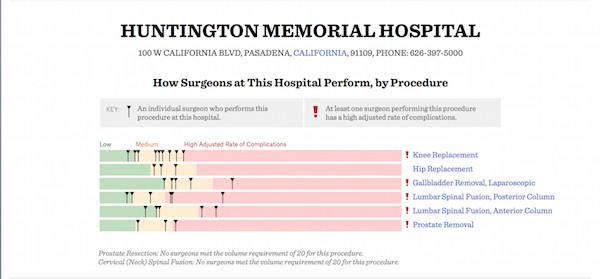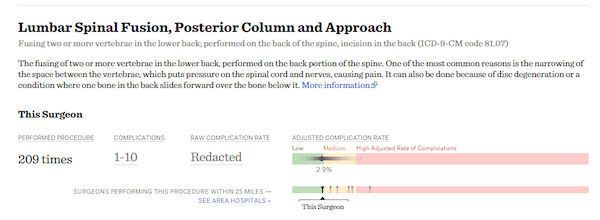In the last year of our lives, almost a third of us will undergo a major surgery. Among adults over age 45, heart surgeries and surgeries on the musculoskeletal system (knee and hip replacements, for example) are most common. Once we reach the age of 65, we undergo surgeries at a rate much higher than our younger peers, and that rate is increasing. The active lifestyles of modern seniors demand pain-free mobility, and this demand is one of the reasons cited by researchers to account for large increases in hip replacements and spinal fusions. Unfortunately, the older we get, the more likely we are to experience surgical complications, including mortality. Between 2009-2013, almost 65,000 Medicare patients were readmitted following surgical complications, and 3,405 died during an elective surgery.
So how can we increase the chances of a successful, complication-free surgery? Relying on the reputation of a “good hospital” is not enough, as complication and mortality rates vary widely among surgeons at the same hospital. But a new tool from award-winning investigative news organization ProPublica, Surgeon Scorecard, may help. The tool allows consumers to see how hospitals and individual surgeons compare to their peers on surgical complication rates. The procedures included are among the most common surgeries performed on older adults, and the data is derived entirely from surgeries paid for by Medicare, making this a tool that is especially useful for seniors. The 8 surgeries covered are:
- Knee replacements
- Hip replacements
- Gall bladder removal
- Fusion of the back of the lower spine (called Lumbar spinal fusion, posterior column and approach)
- Fusion of the front of the lower spine (called Lumbar spinal fusion, anterior column and approach)
- Prostate removal
- Prostate resection
- Cervical (neck) spinal fusion
What information is included in the database?
The database has been praised by healthcare experts and professional organizations for the accuracy of its information and for holding surgeons publically responsible for their performance. Complication rates for 16,827 surgeons operating at 3,575 hospitals are included. ProPublica analyzed millions of Medicare billing records from 2009 to 2013 on the eight surgeries, excluding trauma and high risk cases. Complication rates were adjusted for age, patient health, and other factors. Researchers worked with doctors to define a complication as a re-admittance to any hospital within 30 days of the original surgery for certain surgery-specific issues. Complication rates, defined generally as low, medium, or high, are available only if a surgeon has performed a procedure at least 20 times. To protect patient privacy, exact numbers of complications are reported only for surgeons with 11 or more complications per surgery. Information from patients who paid with private insurance is not included.
Consumers access the site and use a search bar to search by hospital or surgeon, or to see information on statewide complication rates for their home states. The existence of a database such as Surgeon Scorecard represents a major step forward in providing seniors with the information we need to make informed healthcare choices and increasing transparency among hospitals and surgeons.
What will consumers see if they search for hospitals?
In the example below for Huntington Memorial Hospital, consumers can see from the red exclamation points that there is at least one surgeon at Huntingdon with higher-than-normal complication rates for all procedures except knee replacement. Clicking on the icon for an individual surgeon takes you to that surgeon’s scorecard.
(Click image to enlarge)
What will consumers see if they search for surgeons?
At the surgeon level, search results return a screen similar to the example below for each procedure. Consumers can see how the surgeon performed compared to peers nationally and compared to surgeons in the nearby area, so it is possible to use the site to find a local surgeon with the lowest rates of complications for each of the surgeries included.


